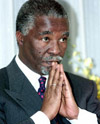
Just in time for yesterday’s Security Council meeting on Sudan, the African Union mediation team reported out on ongoing North-South talks in Khartoum. The four-page communiqué left the impression that there is growing consensus on a number of sticking points between the two parties, but an important fact remains: The framework agreement that the statement details, which spells out common principles and negotiation processes going forward, has not yet been signed by either party.
The statement describes the outstanding issues of contention, a now well-known list of factors that, even one-by-one, could spark instability between North and South. Less than two months out from the vote, the daunting list contrasts with – and in some ways seems to contradict – the parties’ pledges to “find peaceful solutions” and “never to resort to war again.”
Secretary Clinton no doubt spoke for many when she said to the Security Council, “we all fervently hope that is the case,” in reference to similar pledges.
The AU panel’s statement also underscores the intractable nature of the Abyei question. It notes that negotiations on Abyei will be referred to the Sudanese presidency to break the deadlock. Enough sources expanded upon this point, saying that the SPLM indicated it will not sign any agreement without a deal on Abyei.
Some observers speculate that the most likely scenario for Abyei is a region jointly administered by North and South, probably with a high degree of involvement from the United Nations. This option would require mutual agreement from both parties to abandon the Abyei Protocol and the 2009 Hague ruling that defined the region’s boundaries. This arrangement has been widely derided as creating a Sudanese Kashmir, but proposals giving Abyei to the South in exchange for financial compensation or creating a confederation in the contested region have been met with mixed reviews, to say the least.
In remarks to the U.N. Security Council yesterday, U.S. Secretary of State Hillary Clinton acknowledged that the Abyei question might be meted out through a political deal rather than a vote. She noted that the CPA obligated the NCP and the SPLM to give Abyei its own referendum, but she noted that the peace deal “also states that the parties themselves can agree to change it.” She added that unless the parties can find a “mutual agreement that is acceptable to all the people of Abyei,” they must follow through with a referendum. Talks between President Bashir and southern President Salva Kiir will restart next week in Khartoum.
The AU panel’s statement leaves something to be desired substance-wise. But it’s hard to fault the mediation team, who is clearly working hard to ensure that a bare minimum of information gets out to the media and the public during a fragile time where even unofficial reactions from party members could undermine the process.
But various sources following the talks said progress is indeed being made, and that chief mediator Thabo Mbeki is keen to package a deal on Abyei with the signing of a framework agreement that will set the stage for negotiations on the host of other sticking points.
NB: For more on the U.N. Security Council meeting on Sudan yesterday, check out U.N. Dispatch. Mark Leon Goldberg was live blogging.
Photo: AU mediator Thabo Mbeki (RFI)

